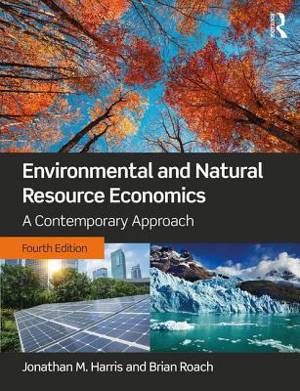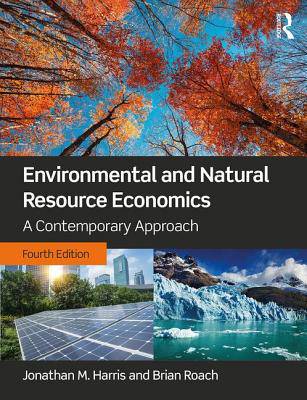
- Afhalen na 1 uur in een winkel met voorraad
- Gratis thuislevering in België vanaf € 30
- Ruim aanbod met 7 miljoen producten
- Afhalen na 1 uur in een winkel met voorraad
- Gratis thuislevering in België vanaf € 30
- Ruim aanbod met 7 miljoen producten
Environmental and Natural Resource Economics
A Contemporary Approach
Jonathan M Harris, Brian RoachOmschrijving
Environmental issues are of fundamental importance, and a broad approach to understanding the relationship of the human economy and the natural world is essential. In a rapidly changing policy and scientific context, this new edition of Environmental and Natural Resource Economics reflects an updated perspective on modern environmental topics.
Now in its fourth edition, this book includes new material on climate change, the cost-competitiveness of renewable energy, global environmental trends, and sustainable economies. The text provides a balanced treatment of both standard environmental economics and ecological economics, based on the belief that these two approaches are complementary. Several chapters focus on the core concepts of environmental economics, including the theory of externalities, the management of public goods, the allocation of resources across time, environmental valuation, and cost-benefit analysis. Material on ecological economics includes such topics as macroeconomic scale, entropy, and green national accounting. Topical chapters focus on: energy; climate change; water resources; international trade; forests; fisheries; and agriculture, with an emphasis on designing effective policies to promote sustainability and a green economy.
Harris and Roach's premise is that a pluralistic approach is essential to understand the complex nexus between the economy and the environment. This perspective, combined with its emphasis on real-world policies, is particularly appealing to both instructors and students. This is the ideal text for classes on environmental, natural resource, and ecological economics.
The book's companion website is available at: http: //www.bu.edu/eci/education-materials/textbooks/environmental-and-natural-resource-economics/
Specificaties
Betrokkenen
- Auteur(s):
- Uitgeverij:
Inhoud
- Aantal bladzijden:
- 668
- Taal:
- Engels
Eigenschappen
- Productcode (EAN):
- 9781138659476
- Verschijningsdatum:
- 16/08/2017
- Uitvoering:
- Hardcover
- Formaat:
- Genaaid
- Afmetingen:
- 193 mm x 246 mm
- Gewicht:
- 1610 g

Alleen bij Standaard Boekhandel
Beoordelingen
We publiceren alleen reviews die voldoen aan de voorwaarden voor reviews. Bekijk onze voorwaarden voor reviews.









